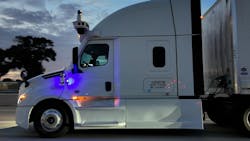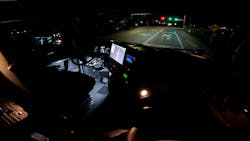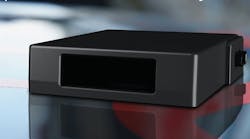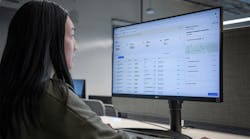Bot Auto completes first Level 4 autonomous truck run in Texas without a driver
Key takeaways
- Bot Auto's first humanless hub-to-hub validation run in Houston demonstrated SAE Level 4 autonomous capabilities over 40 miles during day and night conditions.
- Bot focused on safety, redundancy, and rigorous testing, with plans to expand driverless cargo runs between Houston and San Antonio.
- Multiple Texas-based companies like Torc Robotics, Aurora, and Plus are actively testing and deploying autonomous trucks.
Bot Auto recently completed its first humanless hub-to-hub validation run in Houston, where the autonomous trucking company is headquartered.
Bot Auto achieves first humanless truck run in Houston
The company’s SAE Level 4 autonomous Freightliner truck “operated seamlessly” within its defined domain—without remote assistance or anyone in the cab—navigating real-world traffic conditions as expected, Bot said. The milestone run covered approximately 40 miles on U.S. Highway 90, Interstate 10, and surface streets during a 55-minute round trip to and from Riggy’s Truck Parking in the Houston suburb of Katy, according to reports. The run was executed at sunset to demonstrate day and night navigation.
“This validation run is a meaningful step, but it’s a waypoint, not the destination,” Dr. Xiaodi Hou, Bot founder and CEO, said in a news release.
“Success is simple: Autonomy must beat human cost per mile, consistently and safely. And at Bot Auto, humanless means no human—not in the driver’s seat, not in the back seat, and not behind a remote joystick.”
The July test run served as a “validation benchmark,” demonstrating the maturity and safety of Bot’s autonomy stack and test protocols, the company added. Accomplished within two years of the company’s founding, the achievement underscores Bot’s approach of combining next-generation AI technologies with laser-focused execution. Unlike other players in the space, Bot’s business model is built on offering a transportation-as-a-service (TaaS) solution.
Prior to its breakthrough voyage, Bot also completed end-to-end safety verification and validation for the defined Operational Design Domain (ODD), including “rigorous” closed-course autonomy testing, the company reported. To further safeguard operations, the truck was equipped with multiple layers of protection, including diversified redundancy, continuous health monitoring, and verified minimum-risk fallback—all designed to maintain intended performance under normal conditions and respond safely to unexpected events.
Multiple cameras inside and outside the cab recorded the truck responding to a stoplight and the presence of a first responder, merging onto a frontage road as a vehicle cuts in front of it, slowing down when an RV drifted into its lane, detecting a disabled vehicle, navigating a freeway overpass, safely utilizing “lane bias,” and other autonomous trucking feats.
Bot also has been operating fully autonomous commercial vehicles between Houston and San Antonio with drivers on board for several months now. The company says it plans to conduct its first humanless commercial cargo run between Houston and San Antonio hubs in the coming months as it continues validation. And they’re not the only autonomous trucking technology firm staying busy in Texas.
Texas becomes a hotbed for autonomous trucking innovation
Torc Robotics unveiled in May what it says is the first autonomous trucking hub in Fort Worth, where the Virginia-based company is testing and validating autonomous vehicles, educating potential customers, and supporting Freightliner Cascadias equipped with its Level 4 self-driving technology. “We’re not just opening one more facility, we’re opening a door to the future—the future of autonomous driving,” Torc CEO Peter Schmidt said during a May 13 ribbon-cutting ceremony.
Aurora Innovation launched its commercial self-driving trucking service in May in Texas, with Aurora Driver-equipped trucks making regular driverless customer deliveries between Dallas and Houston, according to the Pennsylvania-based company. Aurora, which is working with Kenworth, Peterbilt, and Volvo, said it plans to expand its driverless service to El Paso, Texas, and Phoenix, Arizona, by the end of this year. “Our commitment to building a transformative technology, earning trust, and assembling a strong ecosystem of customers and partners has made this pivotal milestone possible,” Chris Urmson, Aurora CEO and co-founder, said.
More recently, International Motors said in September it has launched customer fleet trials in Texas using second-generation autonomous vehicles in partnership with PlusAI, a California-based autonomous driving software company. International LT Series trucks with PlusAI’s AI-based SuperDrive technology are now traveling along the I-35 corridor between Laredo and Dallas with select fleet operators, International reported.
“This pilot program is a big step toward seamless digital operations that are designed to deliver an exceptional customer experience,” Tobias Glitterstam, International chief strategy and transformation officer, said. “By working hand-in-hand with our customers, we are proving the commercial viability of autonomous technologies and providing innovative solutions that improve safety, efficiency, and the bottom line.”
About the Author
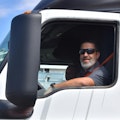
Jason McDaniel
Jason McDaniel, based in the Houston TX area, has nearly 20 years of experience as a journalist. He spent 15 writing and editing for daily newspapers, including the Houston Chronicle, and began covering the commercial vehicle industry in 2018. He was named editor of Bulk Transporter and Refrigerated Transporter magazines in July 2020.
